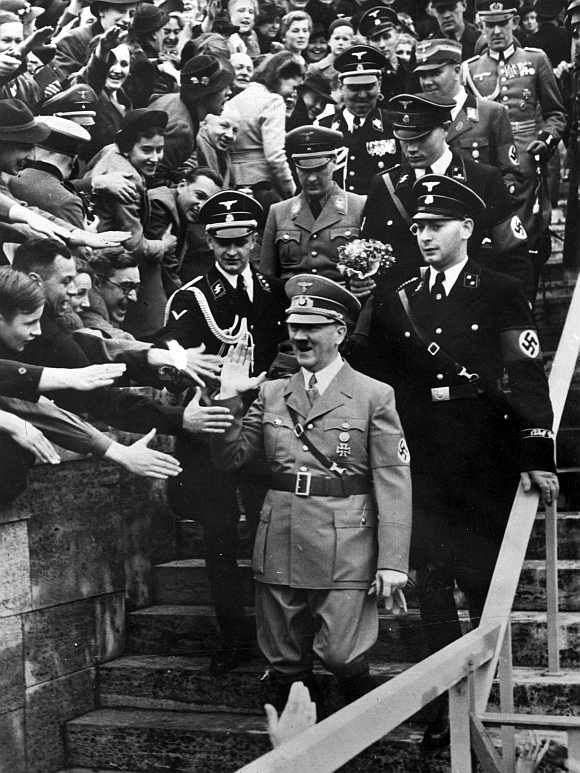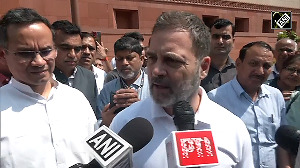'People see problems not being solved, they get tired of waiting, they start asking for a "strong leader" -- and what they really mean is a "dictator". They think that will fix everything. But it won't.'
A German resident in India tells Dilip D'Souza about Hitler and the Nazis and why he is disturbed by what he sees in present-day India.

Back in 2002, The Times of India carried a report (external link) that has stuck in my mind. A poll of Indian students, it said, found that '17 per cent favoured Adolf Hitler as the kind of leader India ought to have.'
Now I have no idea if this was an aberration of some kind, nor if that percentage would be higher (or lower, for that matter) if you conducted the poll today.
All I know is that at the time, a reasonable number of Indian students seemed to admire Hitler, to yearn for his 'kind' of leadership.
All I also know is the frequently expressed desire, among all kinds of people, for a spell under a 'benevolent dictator.'
All I know, too, is that over a dozen Indian publishers (external link) have editions of Hitler's Mein Kampf on the market, selling thousands of copies every month. And there's more.
This is the man, let's never forget, who took Germany through a scarcely believable orgy of bloodshed and to utter destruction, all in little over a decade.
And because I remember that poll and the admiration for a maniac, I sometimes can't resist asking Germans I happen to meet about him. About that horrific war. About the enormous crimes the Nazis committed. About how ordinary Germans today regard this blood-drenched history.
And I ran into one such German recently, a man I'll call B. He has worked in India, for a chemical firm, for several years. I met him and his family at a friend's home. His young sons wore bright cricket shirts. ("B's a big cricket fan," my friend told me. "He knows more about the game than I do!").
So we talked a little about cricket.
But then I mentioned the book I'm currently reading, Daniel Goldhagen's profoundly disturbing tour-de-force, Hitler's Willing Executioners.
Goldhagen's thesis is that it wasn't just a few hundred bloodthirsty Nazis who dreamed up and carried out the Holocaust; instead, it 'engaged the energies and enthusiasms of tens of thousands of ordinary Germans.'
And this had roots in decades of widespread anti-Semitism; these ordinary Germans had been 'nurtured in a society where Jews were seen as unalterably evil and dangerous.'
Here's the analogy Goldhagen makes, and there's a reason I mention it: If we today see democracy as 'a good thing (and)the desirable form for the organization of politics', 19th and early 20th century Germans saw anti-Semitism in just the same way.
To lesser or greater degrees, Goldhagen suggests, nearly every German held to it. And this is the context in which to consider the rise of Hitler.
Naturally, Goldhagen's ideas are controversial, and have been contested. B thinks Goldhagen sometimes goes to extremes, "but I also think he's more right than wrong."
This prompted B to speak of his own experience. His parents are immediately post-war children. But one grandfather fought in World War II and was left with a severely damaged leg. The other served in World War I and was too old to fight by the time World War II came around.
B said neither man, nor his grandmothers, spoke to their families much about the wars. Shame, guilt, even a sense that Germany wanted to shun its World War veterans: Whatever it was, they kept their stories to themselves.
"So how do you look back at all that happened, then?" I asked B.
Born in 1976, he's a whole generation removed from the end of the second war, but not as distant as he thinks his children will be. He spoke of going to visit the sites of various concentration camps -- Dachau, Mauthausen, Auschwitz.
"My high school," he said, "was named for a couple who resisted the Nazis and were executed; so we had to live up to that legacy of resistance." Meaning, see and understand for themselves the scale and horror of Hitler's massacres.
"And I'd go to these places," B said, "and it was so horrible to be there and I'd wonder, how could they do these things?"
A question much of the world has asked, for close to a century now. Goldhagen has answers, if not easy to digest.
In a quiet voice, B continued. "You know, I also would wonder, how did the Nazis manage to come to power at all?"
One answer to that, he said, was that in the years of hardship and depression after World War I, Germans grew "impatient with democracy". And this made it easy for them to turn to Hitler's dictatorship. Easy for him to then plunge Germany into a war it could never win, that slaughtered millions and left a country shattered.
Then, about the impatience, B said: "With respect, when I try to understand it as a modern German, being in India today helps me."
How so, I asked, intrigued.
"I see that same impatience with democracy here sometimes," said B. "People see problems not being solved, they get tired of waiting, they start asking for a 'strong leader'" -- here B actually waggled his fingers in the air, indicating quote marks -- "and what they really mean is a 'dictator'" -- and he waggled his fingers again. "They think that will fix everything. But it won't."
The impatience of the 1920s and 1930s also allowed for often violent suppression of dissent, or any opinions even slightly at variance with whatever the Nazis claimed was a consensus. B said he remembered that when the Shiv Sena went after Shah Rukh Khan for his comments about Pakistani players being absent from the IPL. "I saw that happen," B said. "And I thought, this is exactly, exactly, the kind of thing the Nazis used to do."
We were interrupted about then, and I had to leave soon after. But just before we said our goodbyes, B said to me: "You know, if they could see what we see in Mauthausen or Dachau, I think they would not ask so easily for a 'strong leader'".
His fingers, waggling.
Dilip D'Souza's most recent book is The Curious Case of Binayak Sen (HarperCollins India).
Image: Adolf Hitler 'who took Germany through a scarcely believable orgy of bloodshed and to utter destruction, all in little over a decade.









 © 2025
© 2025